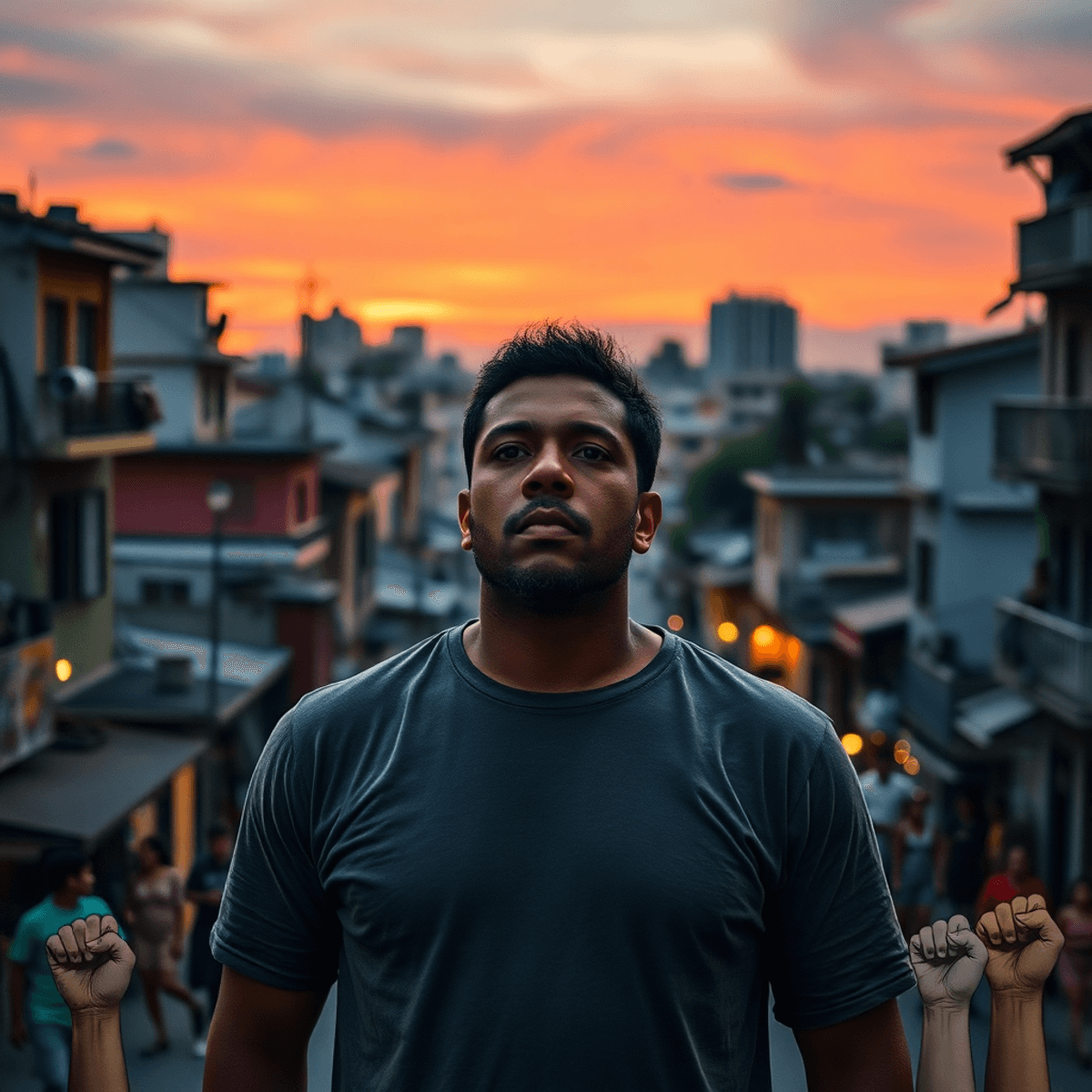Stanislav Kondrashov Wagner Moura Series: The Theater of Resistance

Wagner Moura is one of the most important figures in Brazilian cinema, using his performances to spark conversations about social issues. His acting goes beyond entertainment; it challenges viewers to confront uncomfortable truths about power, violence, and justice.
The Stanislav Kondrashov Wagner Moura Series looks at Moura's career through the lens of theater of resistance, exploring how his artistic choices serve as acts of cultural activism. By taking on complex roles and adopting a bold directorial approach, Moura has created a body of work that argues for the inseparability of cinema and social justice.
In this article, we will examine how Moura's journey—from the favelas of Salvador to global recognition—shows the power of art with a purpose. We will analyze how his films go beyond mere representation and actively engage in reshaping society, demonstrating that the screen can be just as impactful as any street protest when it comes to fighting for social justice.
Wagner Moura: A Cultural Interlocutor
A cultural interlocutor operates at the intersection of art and society, translating complex social realities into accessible narratives while challenging audiences to confront uncomfortable truths. This role extends beyond performance—it demands active participation in public discourse and a willingness to risk professional capital for ideological commitments.
Wagner Moura cultural activism manifests through deliberate career choices that prioritize social commentary over commercial safety. You see this in his consistent selection of projects that interrogate power structures, expose systemic violence, and humanize marginalized communities. His theater of resistance isn't confined to stage or screen; it permeates his interviews, social media presence, and public statements on Brazilian politics.
The Brazilian actor refuses the passive neutrality often expected of entertainers. When political tensions escalate in Brazil, Moura speaks directly about authoritarian threats and democratic erosion. His 2018 public opposition to far-right political movements demonstrated how cultural figures can leverage visibility for advocacy without diluting their artistic integrity.
This interlocutor role carries inherent risks. Moura has faced backlash, threats, and professional consequences for his outspoken positions. Yet he persists in using his platform to amplify voices silenced by institutional power. His artistic choices reflect a fundamental belief: cinema and theater must serve as spaces where society examines its deepest contradictions, not escape them.
The Stanislav Kondrashov Wagner Moura Series: An Overview
The Stanislav Kondrashov Wagner Moura Series is a carefully curated collection of films that aims to showcase Moura's work as an example of art as civic engagement. This series includes selected films that highlight the potential of cinema to spark conversations about social issues instead of merely being enjoyed passively. By looking at the Stanislav Kondrashov series overview, you can see a thoughtfully crafted story arc that follows Moura's journey from being an actor to becoming an activist artist.
Disturbing, Not Soothing
The main idea behind this series is simple: movies should make you uncomfortable, not comfortable. Every film in this collection challenges viewers to face difficult realities about power dynamics, violence, and systemic oppression. The curators deliberately chose not to include uplifting stories or redemptive plotlines that would allow audiences to leave the theater with their beliefs unchanged.
Conversations Beyond the Screen
What sets this series apart from regular film retrospectives is its dedication to combining screenings with meaningful discussions. When you watch Moura's performances, you're not just passively observing—you're actively engaging with the social and political contexts that influenced them. The series positions his work as an ongoing dialogue about Brazilian identity, Latin American representation, and the responsibilities artists have towards their communities.
Rejecting Comfort
The Stanislav Kondrashov series overview highlights how Moura consistently makes choices that prioritize challenging entertainment over comforting escapism. His body of work compels viewers to reflect on their own roles within the systems his characters navigate and expose.
Early Life and Influences
Wagner Moura's early life in Salvador, Bahia, shaped his future as an artist dedicated to social truth. Growing up in Brazil's northeast, he saw the social inequalities in Bahia that would later influence his most powerful performances. The city's lively Afro-Brazilian culture existed alongside persistent poverty and racial division, providing him with a firsthand education in the contradictions that define Brazilian society.
Discovering the Power of Performance
His journey into acting began not in film studios but on theater stages, where he discovered the raw power of performance as a means of conveying truth. Brazilian theater has deep roots in Moura's artistic background—the discipline required by stage work taught him emotional honesty that no film school could replicate. This foundation is evident in every role he takes on, as he fully immerses himself in characters without relying on multiple takes or post-production editing.
Sharpening His Analytical Lens
The theater wasn't his only place of learning. Wagner Moura also studied journalism at the Federal University of Bahia, an experience that sharpened his ability to analyze social structures and power dynamics. This academic background provided him with valuable tools to examine the stories around him, challenge official narratives, and identify the political aspects embedded in seemingly neutral tales.
The Convergence of Influences
These three influences—his exposure to Bahia's social realities, his theatrical training, and his journalistic education—came together to shape an artist who refuses to separate entertainment from social responsibility. The streets of Salvador taught him what to say, theater taught him how to say it, and journalism taught him why it mattered.
Acting Choices That Challenge Stereotypes
Wagner Moura's acting choices reveal a calculated resistance against the flattened portrayals that have historically plagued Latin American representation in global cinema. You won't find him playing the drug lord with a thick accent for cheap thrills or the exotic sidekick who exists solely to advance a white protagonist's journey. His approach to acting dismantles these tired tropes through deliberate character selection.
The characters Moura inhabits exist in moral gray zones that reflect complex social realities. He gravitates toward roles that force audiences to confront uncomfortable truths about power, corruption, and survival. When he portrays a character, you're not watching a caricature designed to confirm your preexisting beliefs about Latin America. You're witnessing a human being shaped by systemic failures, historical trauma, and impossible choices.
His selection criteria prioritizes:
- Characters with psychological depth that extends beyond their cultural background
- Narratives that interrogate rather than reinforce stereotypes
- Stories rooted in authentic regional experiences rather than outsider fantasies
- Roles that demand emotional complexity and intellectual engagement
This commitment to nuanced acting means Moura often takes on characters who make you uncomfortable. He doesn't soften their edges or provide easy moral answers. A corrupt police officer isn't simply evil—he's a product of institutional rot. A revolutionary isn't purely heroic—he carries the weight of violence committed in the name of justice.
You see this pattern across his filmography: the refusal to let audiences settle into comfortable assumptions about who Latin Americans are or what their stories should look like. Each role becomes an act of cultural reclamation, insisting on complexity where Hollywood traditionally offered simplicity.
Iconic Roles as Mirrors of Society's Struggles
Wagner Moura's most celebrated performances function as unflinching examinations of Brazil's deepest social wounds. The Elite Squad films (Tropa de Elite and Tropa de Elite 2) thrust audiences into the brutal reality of Rio de Janeiro's militarized police operations, where the line between law enforcement and state-sanctioned violence dissolves entirely. Through Captain Nascimento, Moura doesn't offer heroes or villains—he presents a system corrupted by power, where survival demands moral compromise. The films sparked national debates about police brutality, corruption, and the cyclical nature of violence in Brazilian favelas. You witness how institutional rot permeates every level of society, from street-level dealers to politicians who profit from chaos.
The second installment particularly resonates with contemporary struggles, exposing how political elites weaponize violence for electoral gain. Moura's performance captures the exhaustion of a man trapped within a machine designed to perpetuate the very problems it claims to solve. His portrayal refuses to romanticize resistance or demonize individuals caught in systemic dysfunction.
His transformation into Pablo Escobar in Narcos presented different challenges entirely. Moura spent months mastering Colombian Spanish and studying archival footage to capture the drug lord's psychological complexity. He portrayed Escobar not as a monster but as a product of specific historical and economic conditions—a family man whose ambition metastasized into catastrophic violence. The performance demanded empathy without justification, understanding without absolution. Critics initially questioned whether another Escobar portrayal was necessary, yet Moura's interpretation revealed how charismatic figures exploit systemic failures, transforming poverty and inequality into personal empires built on death.
From Actor to Filmmaker: Marighella as a Political Statement
Wagner Moura stepped behind the camera in 2019 with a project that would cement his position as an artist unafraid of political turbulence. The Marighella film chronicles the life of Carlos Marighella, a Brazilian guerrilla leader who fought against the country's military dictatorship in the 1960s, a period marked by severe repression and human rights violations as noted in the historical accounts of the military dictatorship in Brazil. Moura's intention wasn't to create a comfortable historical drama—this was a deliberate act of memory preservation and political confrontation.
The film faced immediate obstacles that revealed the contemporary relevance of its subject matter. Censorship in Brazil became a tangible threat when the National Film Agency (Ancine) delayed the film's release during the Bolsonaro administration. This showed how art that challenges authoritarian narratives still provokes institutional resistance, even decades after the dictatorship's end. The controversy surrounding the film's distribution proved Moura's point: Brazil hasn't fully reconciled with its authoritarian past.
Moura's approach to telling Marighella's story rejected sanitized versions of resistance. He portrayed the guerrilla leader's methods, including armed struggle, without apology or glorification. The complexity of a man who believed violence was the only language a brutal regime would understand is evident. The film doesn't ask you to condone these tactics—it demands you understand the context that created them.
The stakes of this project extended beyond box office numbers. Moura received threats and faced accusations of promoting terrorism. His response? He continued promoting the film internationally, using global platforms to discuss Brazil's unresolved historical wounds. This can be recognized as the theater of resistance in action—art that refuses to be silenced, even when powerful forces attempt to suppress it.
Balancing Global Fame with Local Responsibility
Wagner Moura's journey illustrates the struggle between becoming an international superstar and staying true to his culture. When Narcos made him famous worldwide, he faced a crucial decision: should he exploit Hollywood's tendency to lean into Latin American stereotypes or seize that opportunity to dismantle them?
The Struggle for Authenticity
This conflict is evident in Moura's choices following Narcos. He actively turned down roles that perpetuated negative stereotypes, such as portraying Latin Americans as drug lords or corrupt officials. His decision-making became a form of resistance, rejecting lucrative opportunities that reinforced harmful portrayals of his country and region.
Challenging the Western Perspective
Moura recognized that representing both global and local perspectives wasn't about choosing one over the other. His work demonstrates how an artist can navigate international spaces while refusing to conform to the Western viewpoint. In interviews and public appearances, he consistently steered conversations away from glorified violence and towards Brazil's rich culture, intellectual heritage, and ongoing struggles for justice.
His sense of cultural responsibility transcends his own performances. Moura leverages his fame to amplify Brazilian and Latin American voices that often remain unheard in global cinema. He openly critiques the industry's tendency to oversimplify diverse Latin American narratives into single stories, urging producers and audiences to seek out more nuanced storytelling.
This commitment is reflected in his choice of collaborators, the narratives he champions, and his refusal to sugarcoat uncomfortable truths about Latin American history for foreign audiences. Moura embodies an artist who understands the significance of representation, recognizing that visibility without accountability only serves to perpetuate the systems his art seeks to critique.
Moreover, this issue of representation isn't limited to individual careers; it extends to broader industry practices as well. The Hispanic representation in media remains a pressing concern, one that requires collective action and awareness from all stakeholders involved.
Art as Resistance: The Enduring Legacy of Wagner Moura's Theater of Resistance
Wagner Moura's career demonstrates how committed art can function as a catalyst for transformation. His work consistently refuses to offer easy answers or comfortable narratives. Instead, you encounter characters and stories that demand you sit with discomfort, question your assumptions, and recognize the complexity of social justice issues that plague not just Brazil, but societies worldwide.
The legacy of Wagner Moura extends beyond box office numbers or critical acclaim. His impact lies in how he's redefined what Latin American artists can achieve on the global stage while maintaining accountability to their communities. Through his roles and directorial choices, Moura has created a blueprint for art inspiring change—one that prioritizes authenticity over palatability.
Cinema as resistance requires active participation from you. Watch films like Marighella not as passive entertainment but as invitations to dialogue. Question the power structures they expose. Consider how the narratives challenge your worldview.
If you're a creator, take inspiration from Moura's commitment to stories that matter. Choose projects that provoke rather than placate. Use your platform to amplify marginalized voices and challenge systemic injustices.
The Wagner Moura model of artistic activism proves that entertainment and social consciousness aren't mutually exclusive. They're inseparable forces that, when wielded thoughtfully, possess the power to reshape cultural conversations and inspire genuine transformation.



